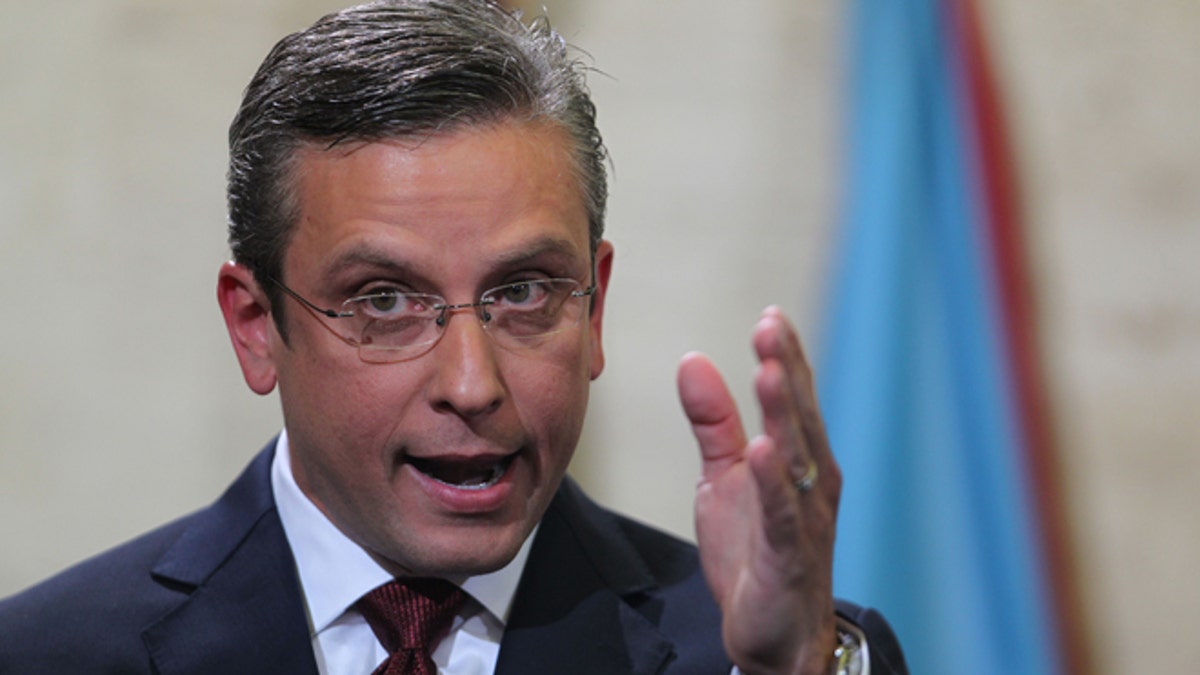
El gobernador de Puerto Rico Alejandro GarcÃa Padilla habla sobre el presupuesto del siguiente año fiscal en el Capitolio estatal, en San Juan, el jueves 30 de abril de 2015. GarcÃa firmó el domingo 3 de mayo una orden ejecutiva que autoriza el uso de la marihuana medicinal en el territorio estadounidense. (Foto AP/Ricardo Arduengo)
SAN JUAN, Puerto Rico (AP) – Legislation that would increase Puerto Rico's sales tax from 7 percent to 11.5 percent squeaked by late Thursday with the minimum amount of votes needed in the U.S. territory's House of Representatives.
The measure also would create a new 4 percent tax on professional services amid a push to generate more revenue during an economic crisis. Two members from the party of Gov. Alejandro García Padilla voted against the bill, which now goes to the Senate for debate.
The narrow approval of 26 votes came just weeks after the House rejected creating a 14 percent value-added tax that the governor said was essential to boosting the economy.
If the Senate approves the latest bill, the sales tax increase would take effect July 1 and the new 4 percent tax would begin Oct. 1. The measure calls for then transitioning to an 11.5 percent value-added tax that would go into effect April 1.
The proposed tax increases could generate $1.2 billion in revenue, which economist Gustavo Velez said would help boost the government's liquidity and strengthen the island's Government Development Bank so it can issue up to $2.95 billion in bonds as planned.
- Best pix of the week
- Puerto Ricans take to streets to protest education cuts, tax hikes
- In Puerto Rico, Jeb Bush pushes statehood, says he’s proud of ‘immigrant nation’
- Murals, makeshift movie houses mark revival of neighborhood in San Juan, Puerto Rico
- Watch: Goya touts largest expansion thanks to Latino ‘authenticity’
- Upscale hotel in Puerto Rico closes amid island’s economic woes
But Velez said it would not solve Puerto Rico's economic problems in the long term.
"We're just buying time," he said in a phone interview. "We have to take advantage of the next year and a half to create a non-political group to pursue a fiscal reform, a tax reform, a government reform and a plan to reactive the economy."
Among those who opposed the bill was Rep. Jenniffer González, spokeswoman for the main opposition party. She said in a phone interview that the legislation would give Puerto Rico a higher sales tax than any U.S. state.
"It's going to have a dramatic impact on the economy," she said.
Opposition legislators argued that the government should instead crack down on tax evaders.
The House approved the measure just hours after Moody's warned that the Government Development Bank might run out of cash by late August if officials don't sell more bonds or take emergency actions. The territory is carrying $72 billion in public debt as it struggles through its eighth year in recession.
"Puerto Rico's debt has risen to unsustainable levels," Moody's said as it announced further downgrades for Puerto Rico's bonds and the Government Development Bank.
Legislators are now preparing to debate a $9.8 billion budget that García proposed late Wednesday that includes $674 million in cuts and calls for the closure of nearly 100 schools and 20 public agencies.
Like us on Facebook
